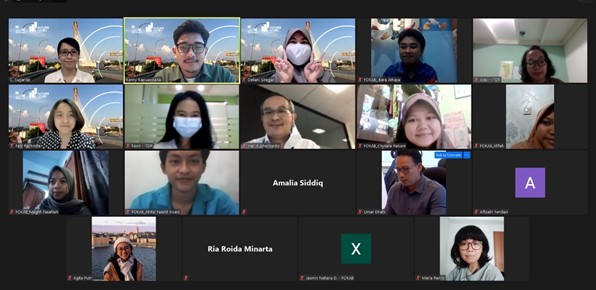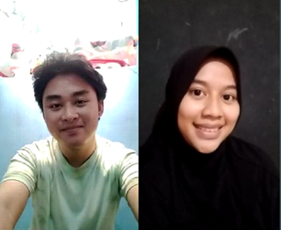Bandung public transport from the view of children and youth
“I take angkot every day because it stops directly in front of my school. Angkot is a better choice because they cover wide routes area and are cheap.”
"But the price to pay is sometime uncertain; and sometimes we get a very old and dirty angkot that make me feel uncomfortable.”
These are few thoughts of the children and youth who attended the online focus group discussions, conducted by the UK Global Future Cities Programme’s (GFCP) delivery partner Mott Macdonald at the initial stage of the project’s implementation. It shows the “love and hate” relationship between the children and youth and the Bandung public transport and calls for the improvements.
Nevertheless, the public transport, especially the traditional minibus called angkot, still is a significant and substantial mean of transportation for children and youth in Bandung. Prior to the pandemic, the public transport, especially the angkot, was the main mobility support for both daily school and off-school activities. Due to the limited condition of the existing public transport in the city, angkot, BST and Damri Bus are still the most affordable and flexible mobility facilities. Therefore, listening to the Bandung’s children and youth views, opinions, and expectations on the needs of public transport improvements in Bandung is very essential, especially aiming to increase the usability of public transport.
|
|
Following the focus group discussions UN-Habitat interviewed two Communication Forum of Bandung’ Children Community (Forum Komunikasi Anak Bandung/FOKAB) leaders, Bara Athaya and Hilda Fadilah. Bara and Hilda completed their high-school education from SMA Muhammadiyah 4 Bandung, and continue their studies at Universitas Pendidikan Indonesia in Bandung. While Bara takes Sociology as his major study, Hilda focuses on Child Education studies. They took the leadership of FOKAB in 2020 with motivation to endorse the rights of children and youth of Bandung. |
“With the escalating growth of Bandung City, children and youths also need to get better living conditions in the city which responds to our needs. Therefore, we wish our voices and participation can be heard and accommodated in Bandung development,” told Bara. He continued: “I, as the member of FOKAB, feel grateful that there is escalating attention from several agencies within the City Government of Bandung to involve the children and youth communities in various discussion forums and city programs. For example, we were invited to the Musrembang 2020 and 2021 as well as to several discussions with the agencies responsible for education, social affair, public health, et cetera; our voices, opinions, and expectations about Bandung’s development were heard and considered.”
“However, we hope there will be a discussion forum to express our opinion and views about public transport condition as well,” said Hilda. Bandung is one of the students’ cities on the island thus children and youth constitute a significant population of the city. “Public transport, especially angkot, are particularly important for children and youths’ mobility in Bandung. However, we feel that concerns relevant to children and youth, especially female, safety still needs a lot of improvement. Safety is not only related to driving, but also to the behaviour of drivers and other passengers; criminal activities such as robberies, pickpockets and sexual abuses are still common on the public transport. Moreover, safety improvement at the supporting transport infrastructures, such as the sidewalks and at the bus/angkot stop platforms, are also essential for children and youth, especially during night-time and at the quiet or remote locations.”
Both FOKAB leaders Bara and Hilda praised the GFCP initiative for focus group discussions as the first official reach out to children and youth community. Bara said: “To gain interest of the people to use public transport, its improvement must incorporate the sense of safety and comfort of every group in society, including the children and youth. Moreover, children and youth generation could be the main actor to support the campaign for the transitional transport behaviour from private to public transport use.”

GFCP initiated focus group discussion
While Bara and Hilda represent the voices of children and youth, they also showed their empathy and concern for the economic condition and job security of the local transport – angkot – drivers in case there is a plan of transforming the traditional public transport system in Bandung into a more modern transport system. This concern was expressed by Bara: “I hope there will be improvement in Bandung’s public transport, perhaps by incorporating the use of technology for the users and the improvement of maintenance, so the buses, BRT and especially angkot can be more comfortable and attractive for more people to take public transport. However, in case the government plans to transform public transport into a more modern means, I hope there will be thorough and deep consideration for the job security of traditional angkot drivers. These traditional angkot drivers will be the most vulnerable group in the context of public transport transformation. As of now they do not have secure and steady income, and every day they must compete to be able to get enough passengers. Moreover, during this pandemic, more people choose to use private vehicle, and this is the reason for drastic decline of angkot drivers’ income.” Hilda agreed: “If there are new development in the public transport of Bandung, angkot drivers’ job security must also be considered, prioritized and incorporated into the new system, because they are also the part of the most vulnerable economic group.”
The UK Global Future Cities Programme (GFCP) is working with the Bandung City Government, led by the Bandung Transport Agency (Dinas Perhubungan/DISHUB), the Bandung Planning, Research and Development Agency (Badan Perencanaan, Penelitian dan Pembangunan Daerah/BAPPELITBANG) and other stakeholders by focusing on the Development of an Integrated Public Transport System in Bandung. Traffic congestion along the road network and the poor quality of public transport system in Bandung have been the most critical mobility issues. Therefore, an effective solution to improve the public transport system is needed and this intervention attempts to promote sustainable transport development by ensuring Gender Equality and Social Inclusion (GESI) mainstreaming is promoted and facilitated during the development of the project. This project also attempts to provide access to safe, affordable, accessible, and sustainable transport system for all by improving road safety, notably by expanding public transport with special attention to the needs of those in vulnerable situations, women, children and youth, persons with disabilities and older persons, while ensuring job and economic security for the groups who are vulnerable.
Partner
Mott MacDonald (MM)
Country
Republic of Indonesia
City
Bandung
Themes
Mobility
Author(s)

Cynthia Susilo
UN-Habitat Local Strategic Advisor for the Global Future Cities Program
